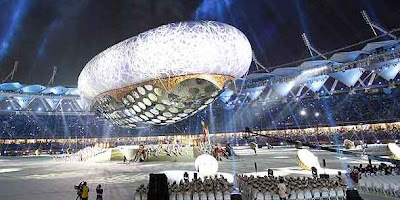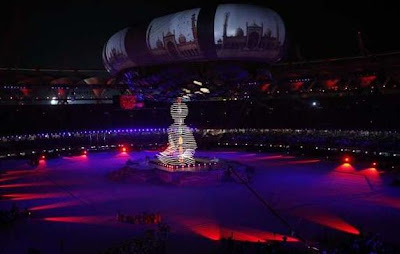This is the first time the even is being held in India and second time in Asia after 1998 games in Kuala Lumpur, Malaysia.
To an eye-catching opening ceremony for the XIX Commonwealth Games at the Jawaharlal Nehru stadium in New Delhi, a crowd of almost 60,000 has been treated. With a worldwide television audience of more than a billion, the opening was billed as bringing “India alive” for the 11-day sporting attraction as 6000 performers showcased 5000 years of India’s history during the three-hour show.
The Games open was declared by Prince Charles after receiving a relay baton that had traveled some 170,000km through all the Commonwealth nations. Teams arrived to find the athletes’ village uncompleted and dirty, a new footbridge next to the main stadium collapsed injuring dozens of workers, and concerns about health, security and transport have also been high.
People were not so keen, but hen it came to forgiving Suresh Kalmadi, chairman of the organizing committee and the face of the troubled Games, whose speech was greeted by an angry chorus of jeers.
As the Delhi skies darkened with Prince Charles and his wife Camilla, the Duchess of York, the ceremony kicked off, and who introduced to the crowd before drummers beat out the “rhythm of India” accompanied by traditional Shankha trumpeters.
Southeastern Indian, Keshav, a seven-year-old prodigy tabla player ed 100 tribal drummers in a percussion section as applause from a rapturous audience built to a crescendo.
The “Aerostat”, an allegedly US$9 million white helium-filled balloon, rose 25m above the ground when the show began. The balloon housed cameras, laser projectors and mirrors providing a 360-degree screening experience as nearly 3000 fireworks danced around the rim of the stadium and lit up the Delhi sky.
According to local media reports, on the opening and closing ceremonies, enlisting an army of choreographers, designers, producers, suppliers, consultants, engineers and administrators, India has spent approximately US$34 million.
Athletes from the 71 competing nations paraded around the stadium, moved to their seats then the Queen’s Baton was brought in and handed to the prince who read out a message from the Queen.
The message said referring to the celebrations marking 60 years of Indian independence and its birth as a sovereign nation in 1947 “It is particularly fitting that the 2010 Commonwealth Games is being held in India.”
“I firmly believe that when countries can compete in sports together like this, it helps all nations to search together for peace throughout the world, to everyone, I send my very best wishes for what I hope will be the experience of a lifetime.” it added.
India’s diverse cultural heritage was celebrated by a procession of wedding guests, mystics and artisans, a human train, tuk-tuk drivers and thousands of folk dancers before the final act — Oscar-winning “Slumdog Millionaire” composer A.R. Rahman singing the self-penned theme song of the sporting extravaganza.
The Games will be held with 16 sports, with England and Australia expected to dominate the medals tally.
The Queen's Baton for the Commonwealth games arrives in India from Pakistan at Indo-Pak check post 'Wagah' around 40 km from the northern Indian city of Amritsar. India, 25/06/2010.
Governor of Punjab state, Shivraj Patil (L), hands over the Commonwealth games baton to chief minister of Punjab, Parkash Singh Badal (R), at Indo-Pak check post at Wagah, India. 25/06/2010.
One of the members of the Border Security Force's music band reacts in the scorching heat while participating in the ceremony of arrival of the Commonwealth games baton in India from Pakistan at Indo-Pak border at Wagah, India. 25/06/2010
Indian Border Security Force officials stand guard during the ceremony of the arrival of the Commonwealth games baton in India from Pakistan at Indo-Pak border at Wagah, India. 25/06/2010
Famous Indian boxer, Vijendra Kumar, holds the Commonwealth games baton along with Mary Kom, the Indian women boxer and three times world champion, at the Indo-Pak check post at Wagah, 40 Km from northern Indian city of Amritsar, India 25/06/2010
Commonwealth games organizing committee head of India, Suresh Kalmadi (L), walks along with Commonwealth games mascot 'Shera' during the arrival ceremony of the Commonwealth games baton into India at Indo-Pak check post at Wagah, India. 25/06/2010
Two Indian Border Security Force officials stand guard during the ceremony of the arrival of the Commonwealth games baton in India from Pakistan at Indo-Pak border at Wagah, India. 25/06/2010
Famous Indian boxer, Vijendra Kumar, holds the Commonwealth games baton along with Mary Kom, the Indian women boxer and three times world champion, at the Indo-Pak check post at Wagah, 40 Km from northern Indian city of Amritsar, India 25/06/2010
The Commonwealth games organizing committee head of India, Suresh Kalmadi (front -C), holds the baton while governor of Punjab, Pakistan, Salman Taseer (2-L), walks along with him at Indo-Pak check post at Wagah, India. 25/06/2010.
2010 Delhi Commonwealth Games will get underway with a grand opening ceremony — an event that will see the likes of music maestro AR Rehman perform and athletes from 71 teams take the oath. The opening ceremony promises to be full of grandeur and elegance with dancers representing the culture of India.
Prince Charles ta 19th Commonwealth Games pahy
Prince Charles ta 19th Commonwealth Games 2010, New Delhi cha Jawaharlal Nehru Stadium liata a pahy haw. Chakhai tawhta Indian President Pratibha Patil ta ”Let the Games begin!” tah pata a phua chanei.
He XIX Commonwealth Games Opening Ceremony liata ahlaopa zy cha: India rah Prime Minister Manmohan Singh, cabinet ahrialah tuapa former President APJ Abdul Kalam, Congress President Pihno Sonia Gandhi, General Secretary Rahul Gandhi, Delhi Chief Minister Sheila Dikshit, Maldives President Mohammed Nashid, Prince of Monaco Albert II, Commonwealth Games Federation President Mike Fennell, Organising Committee Chairman Suresh Kalmadi nata chyhsa peimawhpa hlupi zy chhao ta ahmapa a cha.
Indian contingents zydua Tlaikao laisa, Tlaikao chysia angia kawpa ta hmia achhitha pacha Mawrah liata apahrapa Mawrah chyhsa zydua chata apalaikhei a chhi ta, India rah nata Khizaw liata eima chi nata pho palana daihti soh kawpa nata ngiatlah a chapa ta a la hra.
Thatih akicha viapa ta:
The most expensive Commonwealth Games started on the 3rd of October 2010 at the Jawaharlal Nehru stadium in New Delhi. The opening ceremony was stupendous and attracted great viewership from across the world. Strong crowd that gathered for the opening ceremony was astounded. It was a proud moment for India!
Foreign media praised Commonwealth Games a lot. Sir Steve Redgrave, the five times Olympic gold medalist was really impressed with India’s arrangements for the event and he said that India should take a bid for the Olympics in future.
Ironically, ever since India started preparing for CWG, there has been countless news about corruption in the name of arrangements. The level of corruption was exposed by the media so much that former government minister, Mani Shankar Aiyar who has in the past served as the country’s Sports Minister became the vocal critic of the Games. However, the organizing committee chairperson, Suresh Kalmadi and Delhi government were highly optimistic.
When the participants landed at New Delhi, they complained about the poor unlivable conditions of the rooms. The foreign media till the opening ceremony slammed the Commonwealth Games and then we saw sudden change in their reactions for the fact that India was successful in inaugurating CWG at such a grand scale.
No matter how much India has been applauded for the games; only time will tell us about the intensity of the success. However, the main thing to be pointed out here is the costs that India has incurred for the games.
India has already squeezed up the pockets of not only the state agencies by overrunning the budgets by billion dollars, and approximately 100,000 slum dwellers lost their homes too. The grand CWG stadium is built on the graves of poor slum dwellers.
The slum dwellers as the reaction to an outcry from non-government organizations were shifted to the 7,900 flats in Bawana, the western outskirts of Delhi. The hitch here is that the place at which these poor slum dwellers have been displaced doesn’t connect to the main city with any kind of transportation.
Besides this, people hired to do the cleaning in and around the venue are not paid the amount set for them. These labourers are coerced to work in unsafe and insanitary conditions. In addition, street vendors without the identity proof were asked to leave the city which led to the closure of the roadside eateries.
None of us is unaware of the enormous financial cost of the arrangements that’s almost double the original estimate. The cost India had to pay for the organization has made the 2010 Commonwealth Games the most expensive Commonwealth Games ever! My question is couldn't there be better utilization of the available resources?
Obviously, the stakes were high, but is that a good reason for the authorities to make the games wear such a hefty price tag? India got the opportunity to host such an event but ask the poor slum dwellers they wouldn’t ever say that they are proud of their country.
Once the games are over, the participant of 71 countries will go back to their homes and organizers too will rest well in their bungalows but who will even bother about the wretchedness of the poor slum dwellers? Is India doing justice by organizing such grand event? Are we happily ready for the organization of Olympics?
At last I would like to say Common wealth is games 2010 really a curse for common men & boon for politicians & rich people. 

